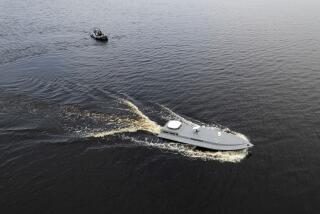Division of Black Sea Fleet Stirs New Pessimism
- Share via
KIEV, Ukraine — Although Russia and Ukraine have backed away from their dispute over who will inherit the powerful Black Sea Fleet that once belonged to the old Soviet Union, Ukrainian officials said Monday that the agreement to divide it, ship by ship, will probably mean a further quarrel over which side gets which ships.
Ukrainian officials said their share of the fleet will depend on which vessels are deemed “strategic” and which “conventional.” They contended that all those ships without nuclear arms are conventional--and, thus, theirs under an agreement reached over the weekend with Russia.
Gen. Konstantin Morozov, the Ukrainian defense minister, further argued that, “once tactical weapons are removed from Ukraine, we think that the Black Sea Fleet should no longer be considered a strategic force” and its ownership should then be renegotiated.
Adm. Igor Kasatonov, the fleet commander, had asserted that the entire force--45 major vessels, 28 submarines, 300 medium-size ships and coastal craft, 151 airplanes and 85 helicopters--is “strategic” in that it projected Soviet influence throughout the Middle East, carried nuclear weapons and countered the U.S. 6th Fleet in the Mediterranean Sea.
Kasatonov had insisted that the fleet should now belong to joint forces of the Commonwealth of Independent States, which includes Russia and Ukraine, and that Ukraine did not need such a huge force. To divide it would be a crime, he said.
Although the fundamental dispute remains over how Ukraine and Russia are to share a prime Soviet asset, the weekend agreement nonetheless moved the highly emotional issue out of the political arena, where the top leaders had begun quarreling publicly, to a committee of experts now meeting in Moscow.
“There has been and still is a strong friendship between Ukraine and Russia,” Viktor Antonov, the Ukrainian minister in charge of converting its defense industries to civilian production, told a press conference here. “I am sure that there will never be large-scale conflicts between them.”
But more than the future of the fleet is at stake in the continuing discussions, because the definitions agreed upon by the Ukrainian and Russian specialists likely will carry over to some land forces as well. And a broad definition could mean larger Commonwealth forces--under Russian command--in Ukraine than most here want.
Ukrainian officials said they expect the discussions to be difficult and made clear that they have not, contrary to some earlier reports, accepted a 30% share of the fleet as their portion.
Whatever the ultimate Ukrainian share proves to be, much of it may be sold or scrapped. Ukraine, officials said, has no intention of sending its ships into the Mediterranean.
“Just because we say no one has the right to decide what is on our territory does not mean that we intend to keep it all,” Antonov commented.
More to Read
Sign up for Essential California
The most important California stories and recommendations in your inbox every morning.
You may occasionally receive promotional content from the Los Angeles Times.













